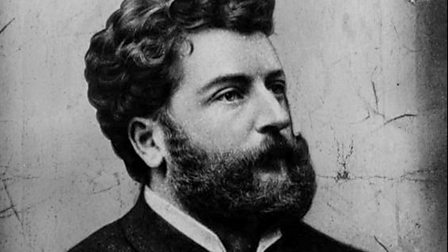Georges Bizet, a French composer of the Romantic era, is best known for his operatic masterpiece “Carmen.” His music, characterized by its memorable melodies, rich orchestration, and dramatic intensity, has left an indelible mark on the world of classical music. Here are the 10 best compositions by Georges Bizet, each showcasing his genius and versatility.
1. Carmen (1875)
Undoubtedly, Bizet’s most famous work, “Carmen” is an opera in four acts based on the novella by Prosper Mérimée. Premiering in 1875, it tells the story of the fiery gypsy Carmen and her tragic love affair with Don José. The opera is filled with memorable arias and choruses, including the “Habanera” and the “Toreador Song.” Despite its initial mixed reviews, “Carmen” has become one of the most performed operas worldwide.
2. L’Arlésienne Suites Nos. 1 and 2 (1872, 1879)
Originally composed as incidental music for Alphonse Daudet’s play “L’Arlésienne,” Bizet later arranged the music into two orchestral suites. The first suite was created in 1872, and the second was arranged posthumously by his friend Ernest Guiraud. These suites feature beautiful melodies and rich orchestration, with movements like the “Farandole” and “Adagietto” being particularly popular.
3. Les pêcheurs de perles (1863)
“Les pêcheurs de perles” (“The Pearl Fishers”) is an opera in three acts set in ancient Ceylon. The story revolves around the love triangle between two fishermen, Nadir and Zurga, and a priestess named Leïla. Known for its exotic setting and the famous duet “Au fond du temple saint,” this opera showcases Bizet’s melodic gift and his ability to create atmospheric music.
4. Symphony in C Major (1855)
Composed when Bizet was only 17 years old, the “Symphony in C Major” is a remarkable work for such a young composer. It remained undiscovered until 1935 but has since become a staple in the symphonic repertoire. The symphony is full of youthful energy and lyrical beauty, with its lively outer movements and a serene Adagio.
5. Jeux d’enfants (1871)
“Jeux d’enfants” (“Children’s Games”) is a suite of twelve miniatures for piano duet, later orchestrated by Bizet into five movements. This charming work captures the innocence and playfulness of childhood, with pieces like “L’escarpolette” (“The Swing”) and “Le bal” (“The Ball”) being delightful examples of Bizet’s ability to create vivid musical scenes.
6. Djamileh (1872)
“Djamileh” is a one-act opéra comique set in Cairo, focusing on the love story between a slave girl, Djamileh, and her master, Haroun. Though not as well-known as “Carmen,” this opera contains beautiful music and a compelling narrative. Bizet’s use of exoticism and his orchestration skills are evident throughout this work.
7. Roma (1860-1871)
Originally conceived as a symphony, “Roma” went through several revisions and incarnations before being completed as a four-movement orchestral suite. Inspired by Bizet’s travels in Italy, the music reflects the vibrancy and color of the Italian landscape and culture. Despite its lesser-known status, “Roma” is a work of great charm and sophistication.
8. Ivan IV (1865)
“Ivan IV,” also known as “Ivan the Terrible,” is an unfinished opera based on the life of the Russian tsar. Although Bizet never completed the opera, the surviving music is powerful and dramatic, hinting at what could have been another operatic masterpiece. The existing fragments demonstrate Bizet’s skill in creating intense and evocative music.
9. La jolie fille de Perth (1867)
“La jolie fille de Perth” (“The Fair Maid of Perth”) is an opera in four acts based on Sir Walter Scott’s novel. Set in medieval Scotland, it tells the tale of love, jealousy, and intrigue. The opera includes beautiful arias and ensembles, showcasing Bizet’s talent for writing captivating and expressive vocal music.
10. Te Deum (1858)
One of Bizet’s early works, the “Te Deum” is a grand choral composition for soloists, choir, and orchestra. Written when Bizet was still a student, it displays his budding talent for choral writing and his understanding of sacred music. The “Te Deum” is a powerful and uplifting piece, highlighting Bizet’s versatility as a composer.
Conclusion
Georges Bizet’s contributions to classical music, particularly opera, have left an enduring legacy. From the fiery passion of “Carmen” to the lyrical beauty of “Les pêcheurs de perles,” Bizet’s music continues to captivate audiences worldwide. His ability to blend memorable melodies with rich orchestration and dramatic intensity ensures that his compositions remain beloved classics in the world of music.


Comments are closed